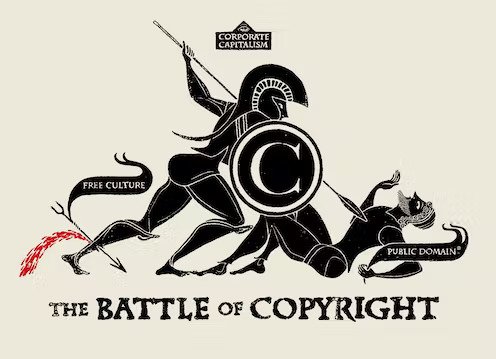Who benefits from Canada’s recent extension of copyright? Dead authors? Students? Marginalized writers? If you answered no to all of these, you’d be correct.
At the beginning of January, Canada extended its copyright period by an additional 20 years after an author’s death. Previously, copyright lasted up to 50 years after an author’s death. The extension means that works will not enter the public domain in Canada for 70 years after a creator’s death.
The Supreme Court of Canada has made it clear that “Copyright law does not exist solely for the benefit of authors,” but is meant to balance the rights of users and authors.
The Supreme Court has also stated that while copyright should ensure a just reward as incentive for authors, “increasing public access to and dissemination of artistic and intellectual works, which enrich society and often provide users with the tools and inspiration to generate works of their own, is a primary goal of copyright.”
The latest copyright extension is a result of the trade negotiations that created the Canada-United States-Mexico Agreement (CUSMA) — the successor to the North American Free Trade Agreement (NAFTA).
Like any monetary negotiation, these trade agreements include give and take. Canada gets greater access to U.S. markets, for example, while the U.S. gets Canada to adopt the same copyright duration that they have.
Copyright material is increasingly valuable to Canada. In 2019, copyright-based industries contributed about $95.6 billion to Canada’s economy and made up around 4.9 per cent of GDP. That means the country needs a more fine-tuned approach to trade deals. And a better understanding of how to best foster our creative industries.
Who benefits from longer copyrights?
Most authors need to license their work for it to reach a wide audience. The Copyright Act grants first ownership to the author who can license it. The act also states that the economic rights belong to the owner of the copyright. That is most often a media company, collective society, publisher or other corporate entity.
If copyright is a way to incentivize and reward creativity, that incentive should manifest while the author is still alive. The idea of authors benefiting during their lifetime was brought to Parliament’s Copyright Review Committee in 2018 by musician Bryan Adams.
In Canada, copyrights are usually turned over to an author’s heirs 25 years after their death. This right is one of the ways the Copyright Act seeks to maintain a balance between having an economic incentive to be creative and making works available to others for education and inspiration.
Adams suggested that this would do a lot more good for authors if it were to occur 25 years after the copyright was initially granted. That would mean an author could gain greater benefits during their lifetime.
If further proof was needed regarding who really benefits from this extension, an article from Jean-Philippe Mikus of Fasken law firm makes it clear.
Mikus states that the term extension is a “positive development” for copyright owners. But he also highlights that an author’s heirs can simply have the works handed to them. He goes on to suggest that Canadian law needs to copy the American work-for-hire model, essentially ensuring that authors have no claim or ownership in their own creations.
The public domain
Another important aspect of copyright is its public interest goal, and works entering the public domain are essential to fulfill that goal. The International Federation of Library Associations and Institutions clearly outlines the importance of works entering the public domain:
“The public domain is part of the common cultural and intellectual heritage of humanity and is the major source of inspiration, imagination and discovery for creators. Works in the public domain are not subject to any restrictions and may be freely used without permission for commercial and non-commercial purposes. It is important for access to knowledge and must be accessible for the benefit of creators, inventors, universities and research centres.”
Large corporations like Disney have lobbied the U.S. Congress to extend copyright protections.
Law professor Michael Geist points out that an entire generation will lose out on works not entering the public domain for an additional 20 years.
The extension of copyright has been described as essentially stealing cultural works from the public. Canadian authors whose works fall under the extended copyright period include Marian Engel, Adele Wiseman, Hugh MacLennan, Margaret Laurence, bpNichol and Gabrielle Roy, to name just a few.
The public domain allows publishers to publish works that may have been languishing elsewhere because they weren’t seen as being economically viable. In addition, with fewer royalties to pay for the work, publishers are able to add pedagogical material to the text.
It is unlikely that any government will pass legislation to roll back the duration of copyright, but that doesn’t mean there is nothing that can be done.
Geist argues for a registration system for the new extension. The author (owner) of the copyright would have to proactively register the copyright to retain it for the additional 20 years. This would allow works to still enter the public domain, particularly works that might not be being published because they aren’t seen as lucrative enough.
Under the Copyright Act, “Fair dealing for the purpose of research, private study, education, parody or satire does not infringe copyright.” But expansion of the fair dealing exception to include “such as” before the listed purposes could also help encourage new creations and bolster educational goals.
Adding “such as,” similar to fair use in the U.S., makes the list illustrative and allows for wider interpretation of what is an allowable use. This would be in line with recommendation 18 of the government’s Statutory Review of the Copyright Act.
Corporate copyright owners are ultimately most concerned about their bottom line. Better protections for users’ rights are needed to ensure the public retains access to Canadian culture and heritage so Canadian creativity and innovation can continue to thrive.



 Trump Administration Appeals Court Order to Release Hudson Tunnel Project Funding
Trump Administration Appeals Court Order to Release Hudson Tunnel Project Funding  CK Hutchison Launches Arbitration After Panama Court Revokes Canal Port Licences
CK Hutchison Launches Arbitration After Panama Court Revokes Canal Port Licences  U.S. Condemns South Africa’s Expulsion of Israeli Diplomat Amid Rising Diplomatic Tensions
U.S. Condemns South Africa’s Expulsion of Israeli Diplomat Amid Rising Diplomatic Tensions  Trump Administration Sued Over Suspension of Critical Hudson River Tunnel Funding
Trump Administration Sued Over Suspension of Critical Hudson River Tunnel Funding  Missouri Judge Dismisses Lawsuit Challenging Starbucks’ Diversity and Inclusion Policies
Missouri Judge Dismisses Lawsuit Challenging Starbucks’ Diversity and Inclusion Policies  Federal Judge Blocks Trump Administration Move to End TPS for Haitian Immigrants
Federal Judge Blocks Trump Administration Move to End TPS for Haitian Immigrants  CK Hutchison Unit Launches Arbitration Against Panama Over Port Concessions Ruling
CK Hutchison Unit Launches Arbitration Against Panama Over Port Concessions Ruling  Citigroup Faces Lawsuit Over Alleged Sexual Harassment by Top Wealth Executive
Citigroup Faces Lawsuit Over Alleged Sexual Harassment by Top Wealth Executive  Federal Reserve Faces Subpoena Delay Amid Investigation Into Chair Jerome Powell
Federal Reserve Faces Subpoena Delay Amid Investigation Into Chair Jerome Powell  Minnesota Judge Rejects Bid to Halt Trump Immigration Enforcement in Minneapolis
Minnesota Judge Rejects Bid to Halt Trump Immigration Enforcement in Minneapolis  Trump Lawsuit Against JPMorgan Signals Rising Tensions Between Wall Street and the White House
Trump Lawsuit Against JPMorgan Signals Rising Tensions Between Wall Street and the White House  U.S. Lawmakers to Review Unredacted Jeffrey Epstein DOJ Files Starting Monday
U.S. Lawmakers to Review Unredacted Jeffrey Epstein DOJ Files Starting Monday  Federal Judge Signals Possible Dismissal of xAI Lawsuit Against OpenAI
Federal Judge Signals Possible Dismissal of xAI Lawsuit Against OpenAI  Newly Released DOJ Epstein Files Expose High-Profile Connections Across Politics and Business
Newly Released DOJ Epstein Files Expose High-Profile Connections Across Politics and Business  Uber Ordered to Pay $8.5 Million in Bellwether Sexual Assault Lawsuit
Uber Ordered to Pay $8.5 Million in Bellwether Sexual Assault Lawsuit  Norway Opens Corruption Probe Into Former PM and Nobel Committee Chair Thorbjoern Jagland Over Epstein Links
Norway Opens Corruption Probe Into Former PM and Nobel Committee Chair Thorbjoern Jagland Over Epstein Links  China Overturns Death Sentence of Canadian Robert Schellenberg, Signaling Thaw in Canada-China Relations
China Overturns Death Sentence of Canadian Robert Schellenberg, Signaling Thaw in Canada-China Relations 
































